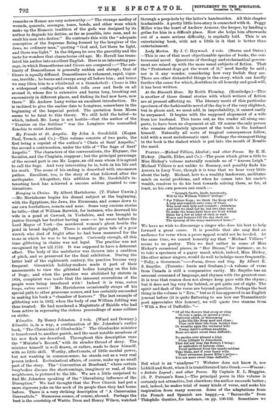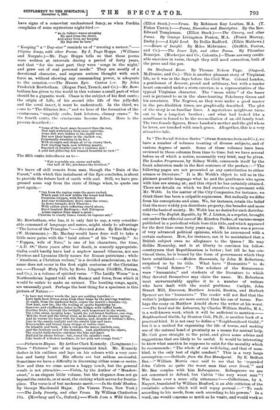POETRY.—Michael Villiers, Idealist ; and other Poems. By E. H.
Hickey. (Smith, Elder, and Co.)—The poem which gives a title to Miss Hickey's volume naturally reminds us of " Aurora Leigh." Michael Villiers is not unlike to Romney, and possibly finds his Aurora in Lucy Vere, though it is true that we hear very little about the lady. Michael, heir to a wealthy landowner, meditates much on social problems, and when he comes into his uncle's wealth, resolves to do his best towards solving them, as far, at least, as his own powers can reach :—
" Lisnagh Castle, lands, tenements, Will be the William Villiers' College?'
" For Villiers Keep; we think the Keep will be A help and comfort unto some of those Who need such help and comfort ; chfitelaine And lord we shall not be, but two that seek To make the home-light they are blest withal Shine for a few at least of such as wait Weary and footsore till the day shall see The opening of the mauy-mansioned home."
We have no wish to discourage a singer who does his best to help forward a great cause. It is possible that she may find an audience for verse when a prose appeal would not be heeded. At the same time, we cannot honestly say that " Michael Villiers " seems to us poetry. This we find rather in some of Miss Hickey's occasional pieces, in " Her Dream," for instance ; or, to to take a specimen of a gayer mood, which, indeed, Miss Hickey, like other minor singers, would do well to indulge more frequently, "Polly, a Governess."—Poems, Grave and Gay. By Albert E. S. Smythe. (Toronto : Imrie and Graham.)—A volume of verse from Canada is still a comparative rarity. Mr. Smythe has an unusual command of language, and rhymes with the greatest ease. It is true that reason does not always keep pace with the rhyme ; but it does not lag very far behind, or get quite out of sight. The spirit and dash of the verse are beyond question. Perhaps the best thing in the volume is " Eva; " but as it has appeared in an English journal before (it is quite flattering to see how our Transatlantic poet appreciates this honour), we will quote two stanzas from " With a Box of Daffodils : "- " Of all the flowers that creep or cling Or rear a spike, or spread a cyme, Scattered afield, or blossoming Lalco-lily-like from mud and slime; That suck their life from builded lime Or wreathe upon the verdured hills Young April's artless anadyme None are more sweet than daffodils.
No garden ever pleased a king
From Lilliput to Jotunheim
That did not bear the flowers I bring ; As asphodels of halcyon clime
Fresh gathered from the meads sublime Take them, and if your fancy wills Their sweetness passes Eden's prime— You are more sweet than daffodils."
But what is an "anadyme " ? Webster does not know it, nor Liddell and Scott, when it is transliterated into Greek.— Winona : a Dakota Legend ; and other Poems. By Captain E. L. Huggins. (G. P. Putnam's Sons.)—The principal poem in this volume is certainly not attractive, but elsewhere the author succeeds better and, indeed, he makes trial of many kinds of verse, and seeks his inspiration from many sources. Some of the adaptations from the French and Spanish are happy,—a "Barcarolle" from Thoophile Gautier, for instance, on pp. 100.102. Sometimes we
have signs of a somewhat unchaatened fancy, as when Perdita complains of some mysterious night-bird:-
"As in vulture waves sweeping He sped from the shore, And away from my keeping My Day-star he tore."
" Keeping " a " Day-star " reminds us of "nursing a meteor."— Pilgrim Songs, with other Poems. By J. Page Hopps. (Williams and Norgate.)—Mr. Page Hoppa tells us that these poems were written at intervals during a period of forty years, and that " for the most part they were songs in the night,' and grew out of real personal needs." They are mostly of a devotional character, and express serious thought with such force as, without showing any commanding power, is adequate to the occasion. —The Human Epic. Cantos i.-v. By John Frederick Rowbotham. (Began Paul, Trench, and Co.)—Mr. Row- botham has given to the world in this volume a small part of what should be a gigantic work. Chaos is the subject of his first canto ; the origin of Life, of his second (the life of the jelly-fish and the coral insect, it must be understood). In the third, we come to "The Silurian Sea ;" and we hear of the formation of the crustaceans, " ungainly crabs, lank lobsters, clumsy craws." In the fourth canto, the crustaceans become fishes. Here is the process described :— " Some of the band, more favoured than the rest,
Had nigh withdrawn from their captivity. Some will were hidden in the gladly vest. But now their leader in the shallow sea, Perpetually wrestling to be fre e With strength and strain of ev'ry sinewy thew, Now starting back, now writhing =sally, Emerged at length—and lo a creature new !
A gold and glittering fish beamed beautiful to view !"
The fifth canto introduces us to-
" Fair vegetable sex, serene and mild, One half of life, perchance the loveliest."
We leave off still remote from man, though the " Ruin of the Forest," with which this instalment of the Epic concludes, is about to provide the future lord of earth with coal. Still, we have pro- gressed some way from the state of things when, to quote our poet again,—
"Out from the raging rents the gases rushed, Which pent till now within the womb bad been. Ferocious Oxygen, with fury flushed And roar tremendous, drove upon the scene; In fierce tornado, fiery Fluorine ;
With yellow glare reflecting round about, Burst lambent Hydrogen ; dull Nitrogene Arises copious from many a spout ; Chlorine in cloudy fumes vomits its vapours ont."
Mr. Rowbotham, who has, it is only fair to say, a very consider- able command of language and metre, might study to advantage " The Loves of the Triangles."—Nero and Actea. By Eric Mackay. (W. Heinemann.)—Mr. Mackay would have done well to take a little more pains with the " local colour " of his " tragedy." As " Poppwa, wife of Nero," is one of his characters, the time, " A.D. 68," three years after her death, is scarcely appropriate. Galba could hardly have had a nephew named Glaucus, nor are Pyrrhus and Lysanias likely names for Roman patricians ; while " Anselmus, a Christian recluse," is a decided anachronism, as the name does not occur in the first eight centuries of the Christian era.—Through Misty Veils, by Rowe Lingston (Griffith, Ferran, and Co.), is a volume of spirited verse. " The Laidly Worm" is a Northumbrian legend told with fluency and force, from which it would be unfair to make an extract. The hunting songs, again, are unusually good. Perhaps the best thing for a specimen is this picture of Nature :—
"In bare wet winter woods the jays are scolding together,—
Love bath been driven away from their home by the starving weather. At night, from the darkened fields, comes the peewit's desolate cry, Now near, now far, like the wailing of spirits wandering by. Sparrows and chaffinches loiter in the hedges with ruffled hoods, Starling flocks, through the twilight, rush homeward to the woods. The robin alone, keeping hope, 'nestle his red-breast feathers, can sing, 'Mid the frost and the biting wind, as he thinks of the coming spring, And he warms his heart with his singing, and, despite of fortune's flaws, Joys in the scanty sunlight and the scarlet hips and haws. Honeysuckle and briouy hang strings of rubies clear,
On bramble and bush. Like a veil are the woven tendrils sere.
And the feathery seed of the clematis. And, gladdening the thaws, The scarlet holly-berries outshine the hips and haws Half-hid by glossy foliage; but, round the spindle's root, Like beads of a broken necklace, lie her pink and orange fruit."
—Pictures in Rhyme. By Arthur Clark Kennedy. (Longmans.)— These " Pictures " are of an impressionist kind. Mr. Kennedy dashes in his outlines and lays on his colours with a very care- less and hasty hand. His effects are but seldom successful. Sometimes we have a difficulty in discerning either sense or metre. Now and then we come across a happy touch, but the general result is not attractive.—Violets, by the Author of " Meadow- sweet," is an elegant little volume, but the elegance does not go beyond the outside, or at most, the etching which serves for frontis- piece. The verse is of but moderate merit. In the Gods' Shadow. By George Macdonald Major. (De Vienne Press, New York.) —The Lady Poverty, and other Verses. By William Chatterton Dix. (Mowbray and Co., Oxford.)—Weeds from a Wild Garden. (Elliot Stock.)—Verses. By Robinson Kay Leathes, M.A. (T. Fisher Unwin.)—Poems, Narrative and Descriptive. By the Rev. Edward Templeman. (Elliot Stock.)—The Canary, and other Poems. By George Livingston Fenton, M.A. (Frank Murray, Derby.)—A Light Load. By Dollie Radford. (Elkin Mathews.) —Hours of Insight. By Miles Midwinter. (Griffith, Farran, and Co.)—The Inner Life, and other Poems. By Pitambar Bonarjee. (Mookerjee and Co., Calcutta.)—These are very credit- able exercises in verse, though they still need correction, both of the press and the pen.



















































 Previous page
Previous page